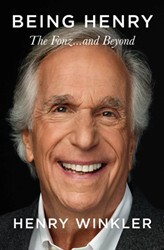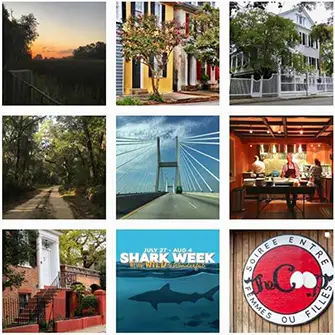
Henry Winkler Opens Up in 'Being Henry: The Fonz...and Beyond'
Beloved Hollywood Actor Found Himself After Happy Days Run, Focusing On Family, Friends & Work Behind the Camera
Jeff Walker, Entertainment Writer
Like many actors who bring an iconic television character to life, beloved actor Henry Winkler will be always be endeared to fans as 'the Fonz'. Although Winkler played the leather jacket clad soft-hearted ladies man Arthur Fonzarelli on the hit TV show 'Happy Days' for a 11 seasons (1974-84), in his latest book 'Being Henry: The Fonz...and Beyond' co-written with James Kaplan, Winkler chronicles his life story from growing up in NYC to being diagnosed with dyslexia at at 34, and from overcoming typecasting to finding a sense of normalcy outside his celebrity. 
In over 240 easy to read pages encompassing a 50 year career in the spotlight, Winkler looks back on a profession he never imagined would have unfolded without reading for the 'Happy Days' pilot in 1973, a screen test he got after making a small appearance on 'The Mary Tyler Moore Show'. He wonders how a short Jewish kid of German descent with a $1000 to his name could venture to Hollywood, and in less than a year become one of the most recognized faces in America.
While he admits the show brought him instant fame and financial independence, the same notoriety caused Winkler to question family and past acquaintances including the synagogue and Yale University as to their motives, whether sincere or just trying to cash in on Henry's overnight success.
One of funnier recollections in 'Being Henry' is when a former Dean of the Yale Repertory Theatre called asking for a donation. The same man who scoffed at Winkler lowering himself to sitcom level was now in need of financial support, to which Henry admits in the book 'mysteriously I lost my check book'.
'Being Henry' is full of honest recollections, humorous anecdotes, near misses, and holding your head high. Winkler talks about meeting the great Laurence Olivier for a split second, hanging on the street with Paul McCartney and fawning over Mick Jagger, wondering if the Rolling Stones front-man even recognized who he was.
More than a tribute to a 1970's TV icon, in 'Being Henry' we discover while he embraced his chosen career, Winkler cared more about the overall profession, his fellow actors, all the while doing his best to maintain a normal life for his family. When ABC executives came to him with ideas of rebranding 'Happy Days' and making him more the central focus, he turned it down in quick fashion, not only out of respect for his fellow cast members but his growing friendship for Ron Howard.
While the first half of 'Being Henry' deals with 'the Fonz' and often the baggage that came with it, the second half of his book looks back on Winkler trying to distance himself from the famed character, as casting directors are politely turning him down. As he describes, 'We don't want Henry Winkler, we want the Fonz'.
Fortunately, much like Howard had to move on from his clean cut image as Opie Taylor and Richie Cunningham, Winkler discovered like Howard he had a second career as a director and TV producer. Winkler's company brought the first rendition of MacGyver starring Richard Dean Anderson to the small screen for seven seasons (1985-92).
Although the first decade of his near 50 years in the spotlight centered around Arthur Fonzarelli, Winkler has kept busy behind the camera, writing, and producing. When your TV role is bigger than your real life he admits it's hard to take it all in and enjoy down time. His solace came through family. He and his wife Stacey have been married 45 years, raised three kids, and enjoy several grandchildren.
How Henry and Stacey met while he was shopping at an upscale clothing store is easily the most touching, and perhaps the core of 'Being Henry'. It's a Hollywood love story that is not often talked about. Stacey has been his rock, and Winkler is not afraid to share their ups and downs including her bout with breast cancer in the early 2000's and losing their parents. Stacey's own reflections peppered throughout the book provides her perspective on their long marriage, and how due to his work schedule Henry wasn't fully there during cancer treatments.
Without giving to much of the book away, Winkler offers up snippets of how he turned down the biggest movie role in 1978 (due to typecasting), did a low budget film with Stallone before Rocky fame, befriended Adam Sandler, offered advice to Robin Williams, had dinner with Bette Davis, worked alongside Katherine Hepburn, directed Burt Reynolds (Cop & a Half), grabbed a long overdue selfie with Robert DeNiro, and literally talked a young actor off the ledge.
He admits a string of made for TV movies kept him busy, but it was 'Arrested Development' and 'Barry' that re-introduced him to TV viewers in the 21st century, the latter awarding him his first ever Emmy for portraying acting coach Gene Cousineau. Clearly nice guys do finish first.
Hollywood has long praised Winkler for being one of the most genuine people in the business. 'Being Henry' proves that while he had to adjust after 'Happy Days' ended, Henry Winkler picked himself up and determined 'the Fonz' was not his only calling card. Clearly he never bought into stardom. His autobiography is a testament to innate wisdom, wit, and more importantly his life-long loyalty to his craft, family, and friends. All the while dealing with his perceived threat of financial insecurity during the times he didn't have acting jobs.
If you grew up watching 'Happy Days', were a fan of 'the Fonz' as well as Winkler's body of work in front and behind the camera, I recommend 'Being Henry: The Fonz...and Beyond'. It's a charming memoir from one of Hollywood's and America's most accomplished actors and full of never seen before pictures, depicting his early days as well as some of his highlights working with the biggest names in the entertainment industry.



